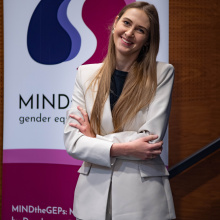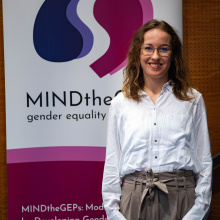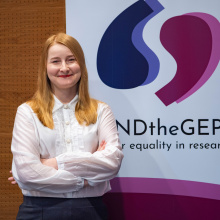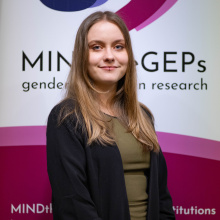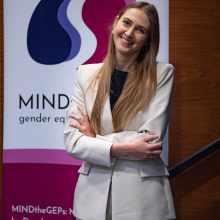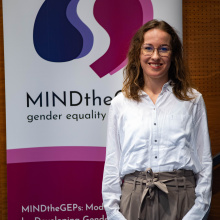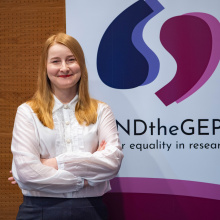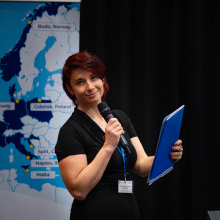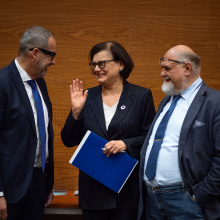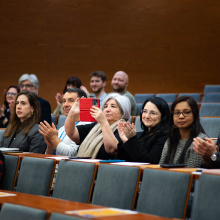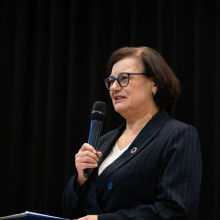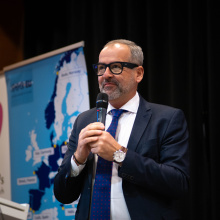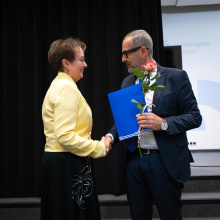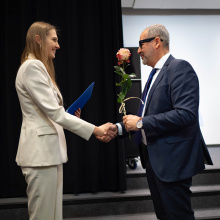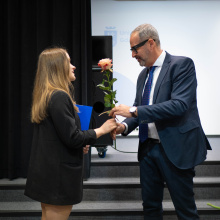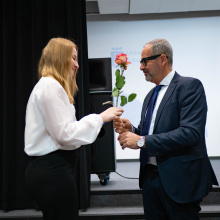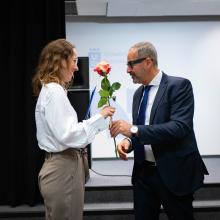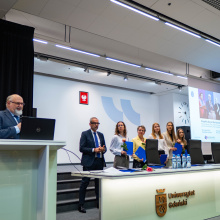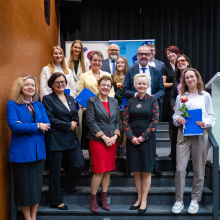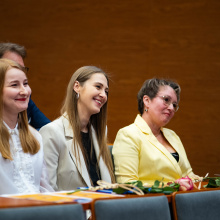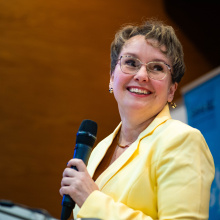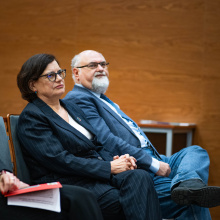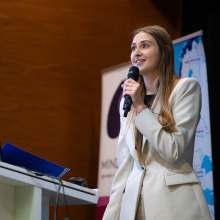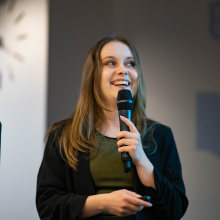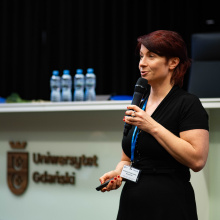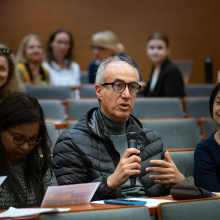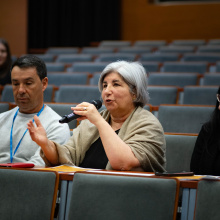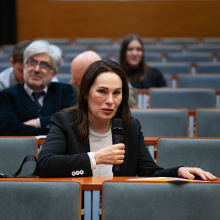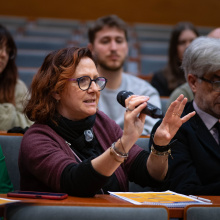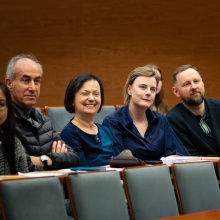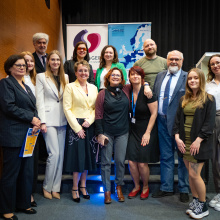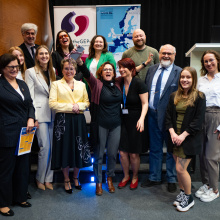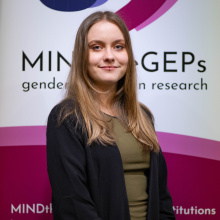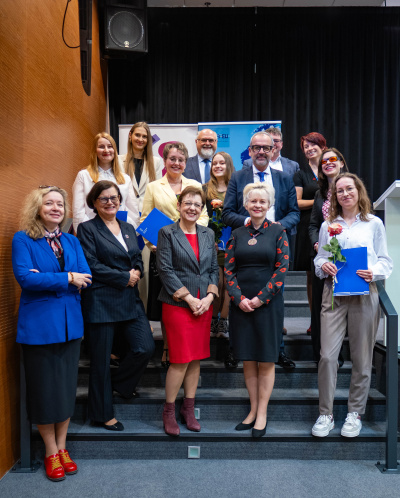
A celebration of equality, inclusivity and neurodiversity at the University of Gdańsk - On 9 April, during a gala at the Main Library of the University of Gdańsk, the winners of the ‘I Include Gender in Research’ competition were awarded and, for the first time in the university's history, the Joanna Schopenhauer Rector's Award was presented. - I don't know if you know it, but you are becoming a historical figure,’ said the Rector of the University of Gdańsk, prof. dr hab. Piotr Stepnowski, to the winner of the award, prof. dr hab. Małgorzata Lipowska from the Faculty of Social Sciences.
The event was opened by prof. dr hab. Ewa Łojkowska and prof. dr hab. Natasza Kosakowska-Berezecka, who emphasised the importance of equality at the University of Gdańsk. Recently, the University of Gdańsk was honoured by the European Commission with the ‘Newcomer Gender Equality Champions’ award for organisations that have made the greatest progress in implementing the Gender Equality Plan. The scientists thanked the Rector of the University of Gdańsk and the many allies who supported their activities in this area at the University of Gdańsk.
UG Rector, prof. Piotr Stepnowski then presented the Joanna Schopenhauer Rector's Award certificate to prof. Małgorzata Lipowska, noting that the award could not have gone to a better person. The winner was also congratulated by prof. Ewa Łojkowska, chair of the Joanna Schopenhauer Award Committee. Then, the chairman of the ‘Włączam Płeć do Badań’ Competition Committee, prof. dr hab. Grzegorz Węgrzyn, and prof. Piotr Stepnowski presented awards and distinctions to the best scientists who include the gender perspective in their research. The winners of the third edition of the competition were:
- Dr Paulina Anikiej-Wiczenbach from the Faculty of Social Sciences UG for the highest rated doctoral thesis in the field of social sciences and humanities
- Dr Monika Górska-Arcisz from the Intercollegiate Faculty of Biotechnology UG and MUG for the highest rated doctoral thesis in the field of exact and natural sciences
- Mgr Sylwia Romańska from the Faculty of Languages at the University of Gdańsk for the highest-rated master's thesis in the field of social sciences and humanities
- Mgr Karolina Palucha from the Faculty of Oceanography and Geography at the University of Gdańsk for the highest-rated master's thesis in the field of exact and natural sciences
The Competition Committee also awarded 5 honourable mentions to dr Sonia Czaplewska and dr Ariadna Łada-Maśko for outstanding doctoral theses in the field of social sciences and humanities, and mgr Paulina Melcer, mgr Weronika Skrzynecka and mgr Julia Stekla for outstanding master's theses in the field of social sciences and humanities.
More about the winners (available in Polish only).
The winners themselves talked about the topics of their award-winning research. Prof. Małgorzata Lipowska presented issues in the field of gender equality and neurodiversity in clinical psychology, including different approaches to ADHD diagnosis depending on the child's gender. Dr Paulina Anikiej-Wiczenbach presented personal, relational and situational determinants of parental responsiveness in men and women, and mgr Karolina Palucha presented the breeding and performance characteristics of the salmonid hybrid Spartic 2. The series of speeches ended with an online lecture by dr Monika Górska-Arcisz on the involvement of the FGFR2 gene in the regulation of the p62/Keap1/Nrf-2 interdependence in luminal breast cancer, which accounts for the largest percentage of breast cancer cases (approx. 50-60%).
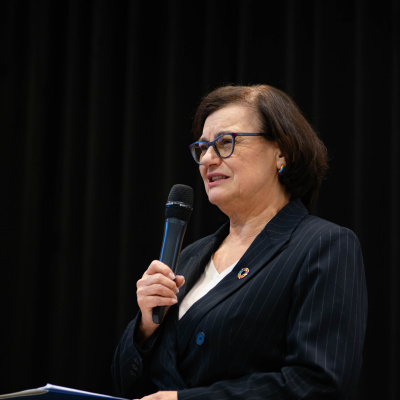
prof. Ewa Łojkowska
‘Today's ceremony was one of the highlights of the implementation of the Gender Equality Plan at the University of Gdańsk. Four years ago, we established an award for research in which researchers include a gender perspective in their research by taking into account the gender of the research subject. This is a very important approach, both in the planning and the analysis of research,’ said prof. Ewa Łojkowska, head of the project Modifying Institutions by Developing Gender Equality Plans - MINDtheGEPs (EU Horizon 2020). ‘Many studies conducted so far have not taken into account, for example, the fact that women and men are built differently. In fact, every cell in the body of a woman and a man is different (they have different chromosomal makeups), and yet, in many cases, our organisms are treated as the same.’
The last item on the agenda was a speech by prof. Natasza Kosakowska-Berezecka, who presented the ‘SEA-EU Inclusive Communication Charter’, a document presenting the idea and principles of inclusive and equal communication, which was implemented in the alliance SEA-EU, co-created five years ago by the University of Gdańsk together with eight other European coastal universities. The scientist presented the most important factors that allow for the creation of an inclusive, equal and safe academic environment for every person studying or working there. She emphasised that such an environment brings benefits in the form of a greater sense of commitment, innovation, efficiency and job satisfaction.
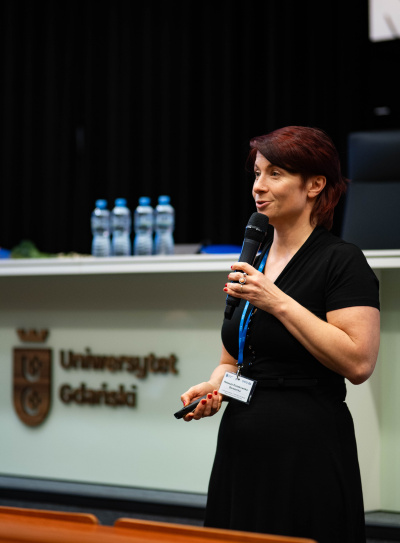
prof. Natasza Kosakowska-Berezecka
‘Research shows that where there is more diversity, there is also more innovation, and research teams with both women and men carry out more innovative scientific projects and publish outstanding articles with high citation rates,’ said prof. Natasza Kosakowska-Berezecka. ‘We must therefore work to build a work environment that allows us to exploit the potential of diversity and counteract the harmful effects of stereotypes. How can we do this? This is exactly what the document ‘SEA-EU Inclusive Communication Charter’ is intended to do, and it will soon be published in Polish.’
The Equality Day at the University of Gdańsk took place as part of the Staff Week for Mental Health & Neuroinclusive Teaching at the University of Gdańsk, which was attended by staff from the University of Cologne, the University of Split, the University of Malta and the University of Algarve. During the event, participants from all over Europe took part in workshops to learn how to better support neurodiverse students in the classroom.

